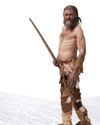The woman who mapped the ocean floor

In the 1920s, Marie Tharp was a little girl who spent many days bumping along country roads with her dad in his rickety green truck. He worked for the Department of Agriculture’s Bureau of Soils, visiting farms. He tested soil and drew planting maps for the farmers. Because of her dad’s job, her family moved a lot. By the time she finished high school, Marie had attended 17 schools. When she wasn’t on the road with her dad or in a new school, there was lots of time alone, reading, drawing, and playing violin.
Marie wanted to become a soil surveyor like her dad. But she knew that was unlikely. In those days, women rarely had careers in the sciences. Most were only encouraged to work as a teacher, secretary, or nurse.
She began her freshman year at Ohio University as an art major and planned to become a teacher. Then she switched to music. Nothing felt right, so she tried classes in German, zoology, paleobotany, philosophy, and finally geology. She loved geology. One of her geology teachers suggested that she also take a drafting class. Drafting is a type of technical drawing. The teacher thought Marie would never find work as a geologist. But if she could draft, she might work in a geologist’s office.
Working around Geology
Marie graduated in 1943 with degrees in English and music. She heard about a petroleum geology program offered by the University of Michigan. Most men were away fighting in World War II. So the school was allowing women to enroll in the program for the first time. Best of all, they guaranteed a job in the petroleum industry after graduation. Marie didn’t hesitate. She graduated from Michigan with a master’s degree in geology. Then she stayed on to take classes in physics, math, and chemistry.
This story is from the May - June 2019 edition of Muse Science Magazine for Kids.
Start your 7-day Magzter GOLD free trial to access thousands of curated premium stories, and 9,000+ magazines and newspapers.
Already a subscriber ? Sign In
This story is from the May - June 2019 edition of Muse Science Magazine for Kids.
Start your 7-day Magzter GOLD free trial to access thousands of curated premium stories, and 9,000+ magazines and newspapers.
Already a subscriber? Sign In

A 12-Year-Old Girl's Election Sticker Is a Winner
VOTING IS A FUNDAMENTAL FREEDOM FOR AMERICANS, A MEANS OF DOING ONE'S CIVIC DUTY AND A WAY AN INDIVIDUAL CAN EXPRESS THEIR VOICE. In 1971, the United States lowered its voting age to 18. But that doesn't mean kids and teens under 18 can't participate in elections in various ways.

If everything the human brain does is basically sets of electrical impulses, how exactly does that translate into a state of mind?
You're not the only one asking this question. Every neuroscientist in the world is wondering the exact same thing, says Zach Mainen

EARTH'S TINIEST BUILDERS
THE HIDDEN WORLD OF MICROBES IN THE EARTH'S CRUST

MUMMIES SPEAK
ABOUT MICROBES, MIGRATION, AND MORE

GOING WITH YOUR GUT
HOW DO MICROBES AFFECT OUR HEALTH? LET'S COUNT THE WAYS...

BUG Detective
A burglar sneaks into a house on a quiet street in New York City. He walks through the house, touching countertops and door handles. Finally, he steals a single card from a full deck. Then he leaves.

Little Creatures Among Us THE MANY MICROBES IN OUR DAILY LIVES
When you think you're alone, you're actually not. In the ground, the air, your room, and even your body are Strillions and trillions of creatures so tiny you can't see them.

A Mars Rock Found With Leopard Spots Could Be a Sign of Ancient Life
IN JULY, NASA'S PERSEVERANCE ROVER CAME ACROSS A SPOTTED ROCK IN WHAT WAS ONCE A RIVERBED IN THE JEZERO CRATER ON MARS.

Para Athlete Uses Exoskeleton Suit to Carry the Olympic Torch
In July, a 36-year-old French tennis para athlete, Kevin Piette, got a chance to participate in this summer’s Olympic torch relay without using a wheelchair.

Ancient Egyptians May Have Used a Water System to Lift Stones to Build Pyramid
HOW ANCIENT EGYPTIANS BUILT THE MASSIVE PYRAMIDS IN EGYPT MORE THAN 4,000 YEARS AGO HAS LONG BEEN A TOPIC OF WONDER AND DEBATE.